The Unfathomable Woes of Rohingyas……
10 October 2017 Blog
The Unfathomable Woes of Rohingyas……
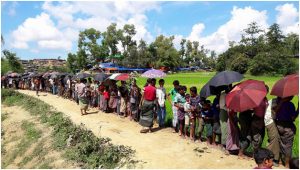 Rohingya refugees from different camps standing in long queues for relief materials
Rohingya refugees from different camps standing in long queues for relief materials
The Rohingya crisis has shaken the entire region, aggravating already severe factional and political strains and deteriorating the relationship between Bangladesh and Myanmar, in particular.Since 28thAugust more than a quarter of a million Rohingya Muslims have flooded into Bangladesh in just two weeks with the emergency situation in Rakhine State worsening after reports of violent clashes that have resulted in over 1,000 Rohingya Muslims butchered, raped and killed.
While Rohingya displacement has persisted for decades, it made headlines last October when attacks on border posts in northern Rakhine state triggered a security clearance operation that drove an estimated 43,000 civilians into Bangladesh by year’s end. By February this year, the estimate stood at 74,000.Many of the new arrivals in Bangladesh’s camps and makeshift sites tearfully narrated the burnings, lootings, shootings, rapes and arrests they escaped back home.
Of course, this is not the first wave of Rohingya that Bangladesh has had to absorb. In 1978, around 200,000 Rohingya fled into the country. Most returned to Myanmar after the two governments struck out a repatriation deal. Another influx came in the early 1990s, as well as in 2012 and in October of last year.
The recent arrivals are most certainly poor and in trouble. Many arrived with nothing but some clothes on their backs. Others who had time to bring along livestock or family inheritances, sold them for literally ‘nothing’ – to the boatmen who ferried them to safety across an estuary that separates their burning villages in Myanmar with Bangladesh. As aid organizations struggle to cope with the sheer scale of need, thousands of Rohingya line the main road here, begging.
There were already more than 200,000 ethnic Rohingya migrants stuck in camps like one in Balukhali (southern Bangladesh). But over the past month, at least 500,000 more — more than half of the Rohingya population thought to have been living in Myanmar — are reported to have fled over the border to take refuge, surpassing even the worst month of the Syrian war’s refugee tide.
According to an estimation by the UN Refugee Agency, over 290,000 people fled for refuge in Bangladesh out of which 80% of refugees are women (50,000 pregnant) and children. However, talking to the concerned authority at the camp site, it was revealed that the total number of refugees could be 8,00,000, with 150 babies taking birth EVERYDAY!!
I feel extremely fortunate to get the opportunity of going to Ukhia with a group who were passionate about standing by people in need. To me, it is very important……to give – however modestly…..with love and affection; to let them feel the human touch and be assured that they are safe from the nightmarish phases experienced in the land they regarded their ‘own’.
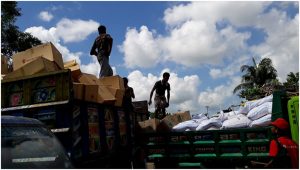 Trucks of relief materials being unloaded for distribution
Trucks of relief materials being unloaded for distribution
The fact that touched me to the core was the spirit of general people’s helping attitude! One youth from the local community said, “The Rohingya are being attacked for no other crime than being Muslims. Until they can go back home, they will be our guests.”
The Border Guards of Bangladesh took over the responsibility of managinvg the refugees and distribution of relief from 25th of August. Each camp had to be very meticulous so that none is deprived of relief material. So they were registered and given tokens in exchange of which they got their allocated relief.
Our group decided to split and visit different camps instead of all five visiting the same ones.
I visited two camps:
- GhumdhumBorder Outpost (BOP)…..on a border with Myanmar
Here we were received by Major Shahed and Major Kibria and briefed about the situation – what a hard time they faced to tackle the tide of Rohingyas from Myanmar. The officers had to wait till getting clearance from the authorities to let them in. These ‘most unwanted people’ had to pass three days in the No Man’s land for 3 days.
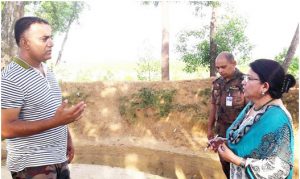 Major Shahed and Major Kibria narrating the saga of the unfortunate influx
Major Shahed and Major Kibria narrating the saga of the unfortunate influx
According to Major Shahed, there were adequate aid pouring in, but sanitation has become a major problem as the number of arrivals were increasing.
Major Shahed led me to the camp and along with his team, helped in distributing what I took with me….in a very disciplined way.
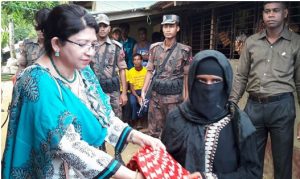 Giving something….no matter how modest and the human touch, does make a lot of difference!
Giving something….no matter how modest and the human touch, does make a lot of difference!
I spoke to some of the Rohingyas…..both males and females. While females were absolutely reluctant to go back even if their homes were given to them and safety ensured, the males were keen on going back as they missed the ‘sense of belonging’ here. They thought their status would remain a ‘Refugee’ as long as they lived here. However, all of them unanimously said they were treated with affection and felt safer.
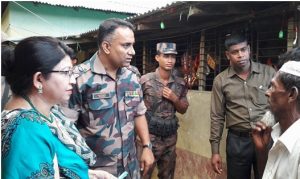 Exchanging messages……in our own line of priorities
Exchanging messages……in our own line of priorities
My message to them was, “Bangladesh is well reputed for its hospitality. We welcome you all with our warm hearts. We are giving in the smallest way we can…..but we all are trying to help you. Our Border Guard Officers are working day and night to ensure your safety and sustenance. Please value our emotions and do not create any environment for us to be disappointed”. (I felt the last lines were necessary as I had already heard some of the Rohingyas were getting involved in criminal activities).
- Thangkhalirefugee camp in Cox’s Bazar.
Here we were received and briefed by SubedarSayedul. He said that initially there were 5,500 refugees but since every day new ones came in the number could be around 8,00,000. He also mentioned how difficult it is for ensuring their confinement in the camp since they were not quite timid or obedient.
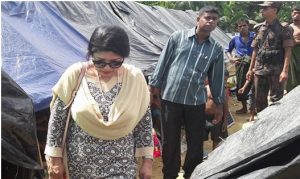 Agonized I was…..as my face shows……visiting individual camps and listening to the harrowing tales
Agonized I was…..as my face shows……visiting individual camps and listening to the harrowing tales
He said, not all of the Rohingyas were poor. Some had gold and cash money….and were getting involved in drug business. Recently, about 500 Yaba tablets were seized!
He and his team members helped us distribute our modest donation to men, women and children who were given tokens. It was also heart rending to talk to them/hear their version, go around the camp and watch the way they were living.
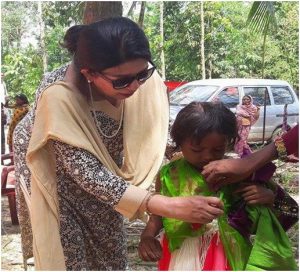 The little girl, still traumatized, expresses her joy at receiving the dress of her favorite color!!
The little girl, still traumatized, expresses her joy at receiving the dress of her favorite color!!
While driving from one camp to another, we saw hundreds of Rohingya refugees fighting to the front of the crowd outside their makeshift camp when an open-bed truck full of Bangladeshi volunteers was passing by, tossing out donated goods at random: small bags of rice, a faded Sponge Bob Square Pants T-shirt, a cluster of dirty frocks.
We also saw trucks of relief material lined up, awaiting distribution.
…………………………………………………………………………………………..
CONCERNS: As a Bangladeshi, I have my concerns and those may be threatening to the overall stability of my country:
- It was so hurting to even ponder on the thought – as international leaders squabble over whether to punish Myanmar for the military’s methodical killing and uprooting of Rohingya civilians, these ‘displaced’ (I would rather call them so instead of refugees) humans were living in abjectly desperate conditions. These were not so much defined camps as a dense collection of bamboo and tarp stacks. When I visited, children were wandering in the mud looking for food and clothes. I went inside a hut and couldn’t hold back my tears to see a newborn baby – lying in dirt, and the mother looking pale and weak.
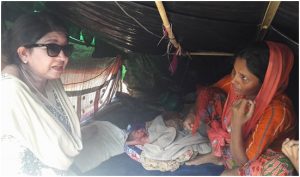 Talking to a mother of 48-hr old baby. Reportedly, every day 150 children are born in different camps. The total number of these helpless people will stand alarming!!
Talking to a mother of 48-hr old baby. Reportedly, every day 150 children are born in different camps. The total number of these helpless people will stand alarming!!
There are worries about cholera and tuberculosis. With no toilets, what’s left of the forest has become a vast, improvised bathroom.
- Bangladeshis by nature are friendly people and jump with whatever they have, to help those in need. However, the country is not exactly a example of prosperity. Nor is it a land of wide, open spaces. Bangladesh has far and away the highest population density of any sizable nation — around 4,800 people per square kilometer, pack the muddy plain that spans most of the country. The average Bangladeshi earns less than $1,800 a year. The overcrowding, the poverty and the underdevelopment are amplified in the country’s far southeast, where the half-million new arrivals have joined hundreds of thousands (who fled earlier waves of violence in Myanmar). Returning to Myanmar anytime soon is simply not in the cards for the Rohingyas. Despite living there for generations, they are considered Bangladeshi interlopers, not citizens, and the question of whetherMyanmar will ever grant return to those who have no paperwork is viewed with great doubt here.
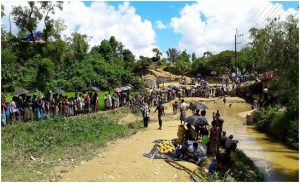 The numbers will only increase…..but will the inflow of assistance be at same pace?
The numbers will only increase…..but will the inflow of assistance be at same pace?
- While Muslim-majority countries have been increasingly promising aid as the number of refugees swells in Bangladesh, Saudi Arabia has not been ‘sympathetic’ as expected. No matter how cruel it may sound, the important point is that natural gas and oil flows through Rakhine state. Therefore, Saudi Arabia is less likely to be outspoken on the Rohingya issue because it actually relies on the Myanmar government to protect the physical security of the pipeline. OIL SPEAKS LOUDER THAN HUMANITARIAN CALL!!!
- Though Bangladeshis bear the spirit of helping the Rohingyas, the conflicting emotions over the influx of these refugees were undeniable. As those living near refugee camps navigate frustration and compassion, political parties have begun responding to the crisis with their own agendas. It will be very easy to manipulate the vulnerable Rohingyas.
- Price of essentials are shooting up…..affecting lives of everyone. The village’s rundown school and a smattering of rice paddies sit across the road from thousands of acres of bamboo huts covered by black tarp – a safe harbour for the refugees fleeing ethnic violence in Myanmar. That land was once a forest where villagers picked wild fruit.
- There is acute fear of deforestation – as the Rohingyas are cutting down trees to build their huts and cook. In winter, they will need more wood to keep them warm.
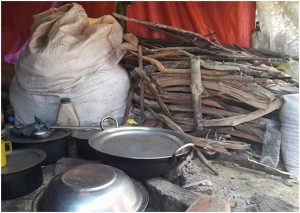 The refugees are cutting off trees for wood to build their camps and also cook meals!!
The refugees are cutting off trees for wood to build their camps and also cook meals!!
- According to some locals, the Rohingyas are rich. They have nice phones, solar panels. Particularly the ones who’ve been here since 1991 are in better shape than many Bangladeshis residing there.
- There was apprehension of rise in criminal activities, since the Rohingyas were not confined to their camps. They are uneducated, idle and therefore ‘devil’s workshop’! They mingle with local goons, they fight, they sell drugs. It is not impossible for any Rohingyas to murder and hide in the camps. They do outnumber the locals…..even law enforcing agencies.
- While some locals were reluctant with their sympathy, bigger players in Bangladesh were eyeing political opportunities even at this time of crisis.
Speaking to Al Jazeera recently, our Honorable Prime Minister Sheikh Hasina brushed aside doubts that her impoverished country could handle the influx (hope she is right), and cast the well-being of the Rohingya as a national cause:
“Bangladesh is not a rich country, it is true. We have 160 million people in a small geographical land,” she said. “But if we can feed 160 million people, another 500 or 700,000, we can do it. We can share our food. We are ready to do it. And our people are already doing it.”
Across Bangladesh, streets and highways are lined with posters depicting Hasina wiping a tear off the cheek of a refugee child. The posters boldly declare: “Sheikh Hasina is the mother of humanity,” and, “Where is humanity, there is Sheikh Hasina.” The opposition parties have their own versions. A hotly contested national election is just one year away.
- Where politicians hope some will see compassion, others are seeing a ploy to curry support from Bangladesh’s religious right, which has come out strongly in favour of welcoming the refugees. Rohingya Muslims largely adhere to a conservative strain of Islam and speak a language similar to the dialect of Bengali prevalent in the country’s southeast. Bangladesh is 90 per cent Muslim.
- The Islamist groups that hounded secularists like Nasreen out of the country are the same ones spearheading the local relief effort for Rohingya refugees. The camps are full of volunteer groups from religious schools and organizations, handing out food, clothes and cash.
One in particular, Hefazat-e-Islam, has staged increasingly large rallies in Bangladesh’s two biggest cities, Dhaka and Chittagong. Tens of thousands have shown up. Hefazat leader JunayedBabunagari issued a public statement saying the Rohingya were facing “genocide” and that if diplomacy fails to return them to their homes in Myanmar, Bangladesh should consider a military intervention.
- As experts have observed, the intensity of these impacts will be more visible when flow of international aid lessens.
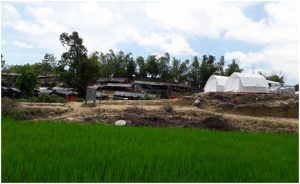 The portion of green land will lessen as the number of camps increase!!
The portion of green land will lessen as the number of camps increase!!
- Economists and experts have warned that Bangladesh’s economy will face multiple adverse impacts if the recently arrived Rohingya from Myanmar’s Rakhine State are not repatriated soon, The detrimental effects are expected to include local food and transport price hikes, food grain shortages, along with increased pressure on natural resources and various social issues.
- According to reports, the budget allocation of FY2017-18 may even fall short as it was finalised without considering the latest Rohingya influx, and the government will continue to spend a lot of money to feed and shelter the refugees. The budget needs to be revised with increased allocation.
- Tourism sector will be hit alarmingly. I spent a couple of days with my friends in Cox’s Bazar immediately after my visit to Ukhia. I noticed there were hardly any foreign tourists. We saw increase of beggars and it was not difficult for me to recognize they were Though their physical features are somewhat similar, the difference is of course noticeable. refugees spreading throughout the district will threaten tourism as tourists will be reluctant to visit over security issues and fears of chaos.
- The Rohingyas carry a strange skin disease. Medical teams have also detected 7 cases of AIDs. These health issues need to be addressed seriously.Camps need to have access to medical centers for vaccination etc. Their unrestricted movement should be strictly under control.
It goes without saying how sympathetic we are for these “stateless minority group” who have been subjected to systematic persecution and grave human rights abuses by authorities for decades. The ongoing conflict has created an unprecedented humanitarian crisis with over half a million families in desperate need of shelter, food and water. Let’s provided them what they need instead of playing with the situation for any political gain or other interests. At the same time, we MUST address the issues of concern…….for our own welfare. We can only help if we are stable and strong ourselves!
I cannot conclude my article without expressing my deep gratitude to Lt Col Zillur Rahman psc, of Bangladesh Border Guards (BGB), who had very kindly and flawlessly coordinated our visit to Ukhia. May Allah shower His choicest blessings on him.
SYEDA NAZNEEN FERDOUSI
Freelance Media Consultant
Share |
